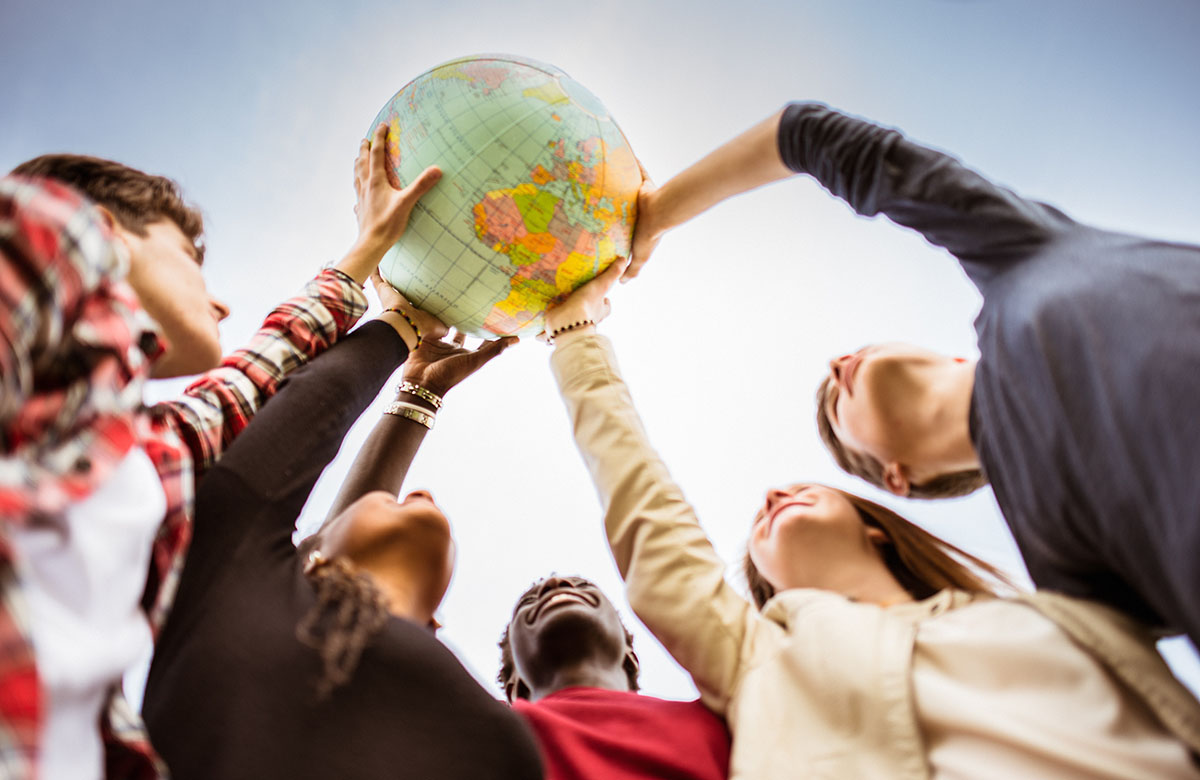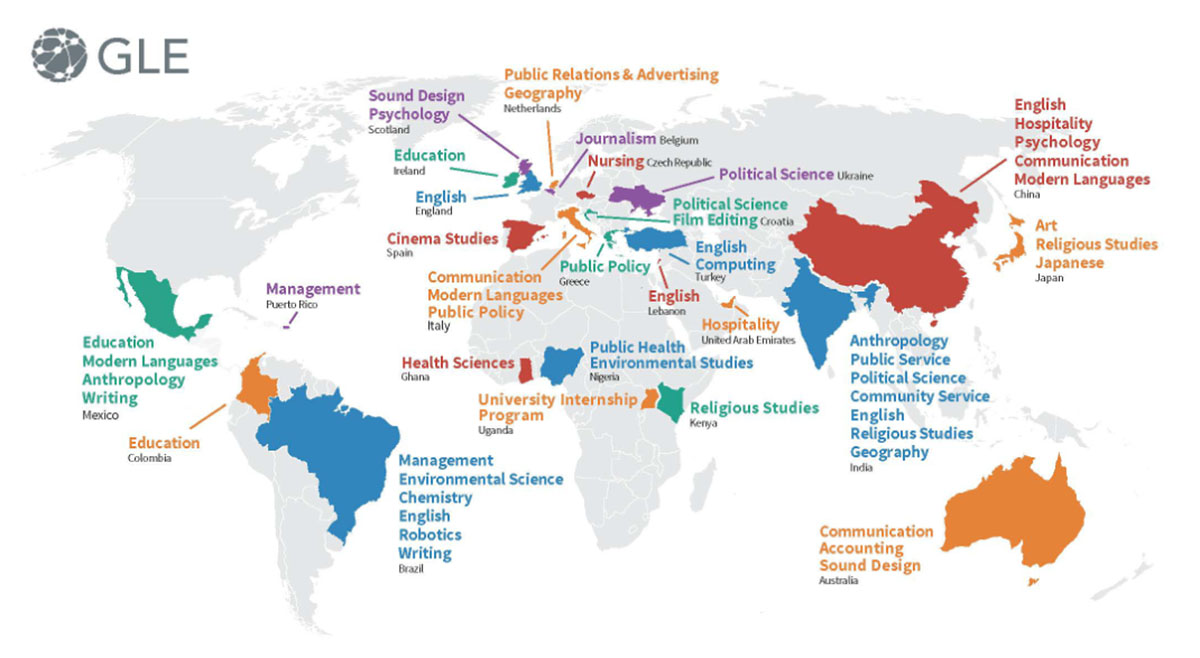 Students seeking to boost their global fluency now have more options, including online study abroad and Global Conversations. (iStock.com/franckreporter)
Students seeking to boost their global fluency now have more options, including online study abroad and Global Conversations. (iStock.com/franckreporter)
As international travel bounces back, some students are eager to study abroad. Many others at DePaul are finding ways to boost their global fluency right from classrooms in Chicago. In recent years, DePaul has emerged as a leader in virtual global engagement, using technology to connect its faculty and students in Chicago with peers around the world.
The pandemic has supercharged those efforts, as DePaul added virtual study abroad and Global Conversations to its internationally recognized Global Learning Experience project.
“International education has traditionally relied on students’ physical mobility as its main strategy,” says GianMario Besana, associate provost for global engagement. “As a matter of equity and access, DePaul has been working for years to expand virtual formats and reach more students. Students returning this fall will continue to benefit from innovations our faculty and staff made during the pandemic.”
Virtual study abroad: Consulting and charcuterie
When associate professor of management Alyssa Westring’s study-abroad course in Barcelona was cancelled in 2020, the
Study Abroad team asked if she would consider moving the experience online. Westring was intent on students “having real-world experience, so in the end they would have a consulting project to add to their resumes.” She is among 13 faculty who decided to hold virtual study abroad courses this academic year.
“I wanted to give students a feel for Barcelona culture,” Westring says. They started each day with a lecture on topics ranging from LGBTQ rights to food and wine. They had a DIY charcuterie-board contest, and learned about the Christmas traditions of Catalonia. Students heard from experts from the U.S. and Spain discuss work-life balance. They consulted with the CEO of a startup, who shared the challenges facing employee wellness during the pandemic. Then students reviewed research and made a presentation of recommendations based on their findings.
“The benefits and skills students require in virtual engagement are different,” Besana says. “Can you make a presentation and do research with people from different cultural backgrounds? Can you be respectful and productive in a virtual environment? These are skills that employers—especially post-pandemic—are going to look for.”
Martha McGivern, director of Study Abroad at DePaul, says these virtual programs are here to stay, with classes in law and animation slated for summer and fall.
 DePaul faculty have taught Global Learning Experience courses with faculty and students in 33 nations and territories since 2013. (Image courtesy of Global Engagement)
DePaul faculty have taught Global Learning Experience courses with faculty and students in 33 nations and territories since 2013. (Image courtesy of Global Engagement)
Connecting Chicago classrooms to the world
Besana says DePaul was poised for a ramp-up of this type of online engagement because of the strength of its gold-standard Global Learning Experiences, or GLE. Since launching in 2013, DePaul has become one of the
top 10 institutions in the world for the number of collaborative online international learning courses offered every year. More than 177 faculty at DePaul have taught GLE classes, which connect synchronously or asynchronously with peer faculty and students in different parts of the world.
Kelly Tzoumis, a professor of public policy in the School of Public Service, teaches GLE courses that reach partners at seven universities across four continents. “As I have grown in my expertise in delivering these courses, our reach has expanded,” Tzoumis says. This winter she taught a course on nuclear waste that connected students in France and the Navajo Nation with those in Chicago.
“It is unimaginable to teach environmental courses without a global partner,” Tzoumis says. “Especially now, it is vital as we understand the complexity of our collective actions in global climate change, deforestation, habitat loss, and issues surrounding our shared waterways and oceans.”
DePaul trains its own faculty as well as those at peer institutions in online pedagogy and cultural competency, to ensure exchanges are meaningful and successful.
When DePaul students sign up for a GLE course, they may be working toward the
Global Fluency Certificate or simply seeking to gain new skills. A 2019 survey showed that most DePaul students who take a GLE course would recommend it to others. The majority also report that the courses introduced them to a new outlook and new ways of thinking about how they relate to the world. Some 3,000 DePaul students have taken GLE courses since the outset of the program.
Tzoumis says GLE courses increase access to a diverse group of learners. “International online learning eliminates barriers. Students who might be limited by mobility or cost can engage without issue.”
Global conversations
During the pandemic, DePaul also launched an online
Global Conversations series to connect faculty and students around the world to discuss scholarly topics.
Faculty members have partnered with colleagues in Brazil, India, Mexico, Nigeria, Australia, the United Kingdom and more, with topics including psychology, public health and business.
Westring has participated in several of the conversations, including those about work-life balance. “At one point I told them, ‘Put me wherever you need me.’ I just like talking to people from other environments, especially students from other cultures,” Westring says. She and a participant from Barcelona are now collaborating on a research project examining remote work during the pandemic.
“For many DePaul students, virtual engagement is a starting point. Some students who participate would have never gone abroad but are attracted to these different opportunities,” Besana says. “We want to open the world to them.”
For more information, visit the
Global Engagement website.
###
Media contact:
Kristin Claes Mathews
kristin.mathews@depaul.edu
312-241-9856